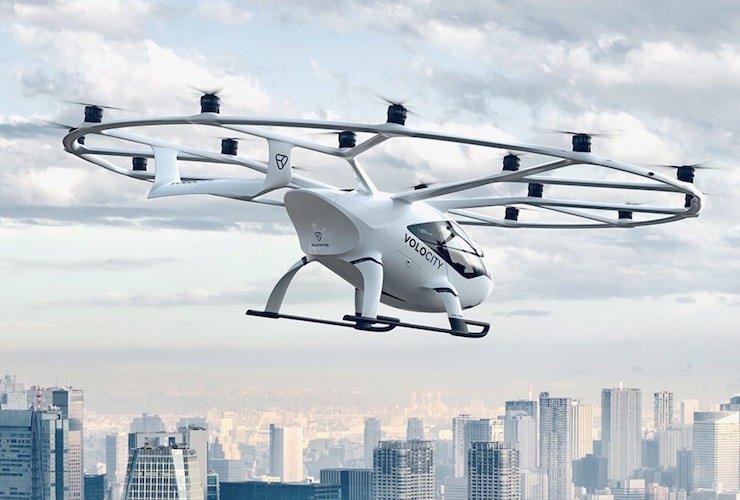
© Volocopter.com
Saudi Arabia’s ambitious plan to transform its entire northwestern NEOM region into a laboratory for smart and sustainable transportation technology received a huge boost last week with the successful testing of eVTOL aircraft produced by the German air taxi company Volocopter.
The test culminated 18 months of collaboration between NEOM’s civil aviation authorities and Volocopter, one of a handful of privately-held companies promoting drone taxis to reduce traffic congestion and enhance sustainability in urban transportation systems.
The test featured Volicopter’s state-of-the-art drone taxi prototype, dubbed “Volocity,” featuring 2 seats (one for pilot and passenger) and 18 rotors with multiple back-up and noise-canceling features that the company claims make it the safest – and quietest – drone taxi currently on the market. Its chief German rival, Lilium, has also begun advanced testing of its own air taxi prototypes, but Volcopter, which first began testing air taxis back in 2011, has made more than 1,500 test flights to date and has already received both Design Organization Approval (DOA) and Production Organization Approval (POA) from the European Air Safety Agency (EASA), making it the first air taxi company in the world to be fully certified to fly anywhere in Europe.
Still, despite their steady progress, Volicopter and Lilium say they have been struggling over the past year to find sufficient numbers of investors to move beyond the early pilot and prototype certification phases to commence full-scale production and eventual commercialization of their aircraft..
A combination of factors, including a recent drop in tech stock valuations, sluggish economic growth and a risk-averse investment environment in Europe, has stalled progress, industry analysts say, causing uncertainty in a drone taxi market that Morgan Stanley estimates could top $1.5 trillion in value by the year 2040.
But that uncertainty may be easing outside of Europe – and indeed, investor interest may well be growing elsewhere – these same analysts say. Saudi Arabia. for example, supported the formation of the joint venture between NEOM and Volicopter with $175 million in seed investment capital back in 2021, and will likely plunge even more into the effort now that the latest flight test has been completed.
Volicopter’s top officials also remain optimistic about their plans for future expansion. “It is beyond exciting to see our work from the past 18 months come to fruition,” Cristian Bauer, a top management official at Volocopter said last week.. “As the first eVTOL aircraft to ever test in Saudi Arabia, we are proud to have laid the groundwork for our future collaboration here in NEOM.”
NEOM’s CEO also hailed the flight test as “another milestone towards the creation of the region’s innovative, sustainable, multimodal transportation system” and a “tangible example of NEOM as a global accelerator and incubator of….. smart, sustainable, and safe mobility systems [that] will improve livability and connectivity in cities around the world.”
Volocpter has tested its state-of-the-art drone taxi previously – for example, last November at a test facility outside Paris – to ensure its technological feasibility. But the latest test in Saudi Arabia was designed to assess the logistical and safety requirements for integrating the company’s drone taxi into the country’s air traffic management system, under shifting weather and environment conditions. By all accounts, Volicooter passed this test with flying (no pun intended) colors.
Volocopter officials say they are standing by to begin full-scale production of 50 air taxis per year – at its recently expanded facility in Bruchsal, Germany – once the company receives the final go-ahead from Saudi Arabian aviation authorities.
Lilium, meanwhile, is awaiting approval from its shareholders to plunge $250 million worth of investment capital into its own main drone prototype, a fixed wing 5-seater that can traverse long distances thanks to 36 jet-powered motors.
A number of American start-ups are also receiving major new investment support.
San Francisco, CA -based Wisk Aero has received $450 million in investment from The Boeing Company, which is backing air taxis to the hilt, its top officials say. Two other US-based companies, Archer Aviation and Joby, have announced long-term partnerships with major commercial airlines (e.g. United and Delta) to create air taxi transportation hubs around international airports in Miami, Los Angeles and New York. Officials at both companies say hundreds of passenger drone taxis have already been pre-ordered in anticipation of a near-term roll-out.
Volocopter has two other air taxi prototypes ready for testing, the Voloregion, capable of flying continuously at high speeds to connect urban hubs to the suburbs, and the Volodrone, an autonomous air cargo drone aimed at major commercial industries. No other Western drone company is currently offering such a wide portfolio of safety-tested autonomous transport vehicles.
|